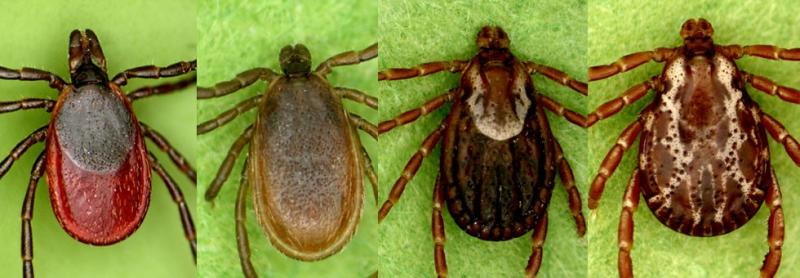By Patti Casey, Vt Agency of Agriculture, Food & Markets
The 2023 Vector Surveillance season was a busy one. The Agency’s stalwart team of six field staff spent more time than usual collecting ticks and mosquitoes and the staff at Vermont Agriculture and Environmental Laboratory were similarly taxed. Staff worked with the VT Dept of Health (VDH) Laboratory and the Centers for Disease Control and Prevention in Ft Collins, CO to test ticks and mosquitoes for pathogens.

Tick Surveillance
- VDH Pathogen Prevalence Spring Tick Survey
The Spring Tick Surveillance in partnership with VDH ran May 5 through June 21. These ticks are collected from 48 established sites every spring. They are counted, identified to species, and tested for four different pathogens that can cause Lyme disease, Anaplasmosis, Babesiosis, and Miyamotoi disease. Ticks are still being counted and identified. Pathogen results for the black-legged ticks (BLT) are pending; American doc ticks (ADT) are not tested.
- VT Agency of Agriculture Statewide Town Density Tick Survey
Staff continue to collect ticks from every VT town over a 5-year period, visiting 25-30 established sites each spring and fall to track population numbers, geographic expansion, and infection rates in ticks. The 2023 spring season ran from April 26 through June 22. Agency staff collected 122 BLTs and 39 ADTs. BLTs will be tested for five pathogens this winter (the four previously mentioned plus Powassan, or Deer-Tick Virus). The annual fall surveillance is underway.
- Fall Asian Long-Horned Tick Survey
The Agency is partway through a study in partnership with VT Fish & Wildlife to inspect harvested deer in southern VT for Asian Long-Horned Ticks (ALHT), a highly invasive tick species not yet reported in Vermont, but which has been found in an adjacent New York County. ALHTs are a wildlife and livestock pest of significance. So far, none have been found on the deer that have been inspected.

Mosquito Surveillance
Agency staff collected and identified to species more than 160,000 mosquitoes statewide (about double the historic average) and submitted over 4,000 mosquito pools for testing. (A pool is 1-50 mosquitoes of the same species collected from the same location on the same date and tested for two pathogens, Eastern Equine Encephalitis (EEE) and West Nile Virus [WNV].) The collection season ran June 26 through October 20.
This year saw an outbreak of EEE in Franklin and Grand Isle counties. Our program did not find EEE in any other areas, but staff detected EEE in 14 mosquito pools from 7 sites in the northwest between August 8 and September 25. One EEE horse death was reported from the area. The Agency collected more than double the historic average number of Vermont’s primary vector mosquito species (Culiseta melanura), and historic flooding resulted in impounded waters that bred large numbers of mosquitoes.
The Agency was poised to conduct an aerial adulticide treatment of the affected areas should VDH have declared an elevated risk to human health, but this was not the case. The Agency’s Public Health and Ag Resource Management Division (PHARM) is putting in place the required permits and contracts if an aerial treatment is deemed necessary in the future, as EEE tends to increase and then decrease in an area every few years.
The Agency also found 11 WNV+ mosquito pools between July 25 and September 28, and one WNV+ horse. No human WNV cases have been reported to the Agency this year.
For more information, visit the Agency’s website, and remember to practice personal protection against tick and mosquito bites:
- Cover up with long sleeves and pants, tuck pants into socks or wear gaiters
- Use an EPA-registered insect repellant or treat your clothing with permethrin
- Limit outdoor dawn and dusk activities when mosquitoes are active
- Put clothing in a dryer on high for 15 minutes, shower to remove crawling ticks after being outdoors
- Do a daily tick check
- Repair broken screens and remove all standing water from your property
For more information, you may contact Patti Casey via email patti.casey@vermont.gov or by phone 802-522-6858.

